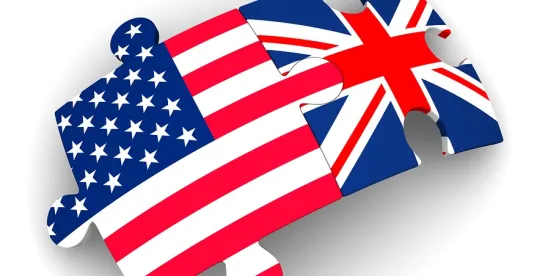The UK and US enforcement agencies have been actively pursuing insider dealing (“insider trading”, in US parlance) since the COVID-19 pandemic ended. The UK and US have different securities enforcement regimes, but both have seen recent developments expanding the scope of conduct that can be prosecuted. For individuals and organizations trading across multiple jurisdictions, it is important to keep abreast of the scope of these offenses and of the different rules that apply in key enforcement jurisdictions. In this article, we will summarize the UK and US criminal offenses of insider dealing and highlight some key similarities and differences between those enforcement regimes. We will review recent legislative changes and enforcement activity and touch upon how enforcement agencies are signaling greater abilities to identify insider dealing, through reporting and the use of more advanced technical capabilities.
UK Legal Framework
In the UK, the criminal offense of insider dealing is committed where a person who has information as an insider deals with price-affected securities in relation to the information. The acquisition or disposal in question must occur in a regulated market, or by or through a professional intermediary.[1] Insider dealing is punishable by up to 10 years’ imprisonment.[2]
Improper disclosure of information to another person or encouraging another person to deal on inside information is also a criminal offense.
Inside information is specific or precise nonpublic information. It must relate to particular securities, or a particular issuer, which would be likely to significantly affect the price of any securities if made public.
A person has information as an insider when they know that it is inside information, and they have it and know that they have it from an inside source. This can include having information as a director, employee, shareholder or professional or obtaining such information through someone in that capacity.
On June 15, 2023, the UK expanded the list of securities[3] under the criminal insider dealing regime to capture currency options, credit default swaps and units in collective investment undertakings, such as exchange-traded funds. It also expanded the scope of the criminal regime to include securities traded on any UK-, EU- or Gibraltar-regulated market, multilateral trading facility and organized trading facility, as well as the NASDAQ, NYSE, and SIX Swiss Exchange.[4]
This article focuses on the UK criminal offense of insider dealing, but it is worth remembering that the UK has broader criminal offenses for market misconduct, as well as civil offenses for insider dealing and market abuse.
US Legal Framework
Federal securities laws in the US create criminal offenses for insider trading and market manipulation. The primary federal regulator in the US is the Securities and Exchange Commission (SEC). Each state also has its own securities laws and regulations, known as “blue sky laws.” While these laws vary from state to state, in general they all govern the offer and sale of securities, as well as the requirements for registration, exemptions and reporting.
The SEC regulates securities trading on the secondary market and US stock exchanges, and participants in these markets. Participants can include securities exchanges, brokerage firms, transfer agents and clearing agencies. The secondary market serves as the platform for trading securities after their initial issuance by a company, including stocks, bonds, stock options and stock futures. In recent years, the SEC has intensified its enforcement efforts to investigate and prosecute insider dealing, mainly targeting hedge funds and expert networks.
In the US, federal securities laws define illegal “insider trading” as “trading a security while possessing material nonpublic information obtained in breach of a fiduciary or functionally equivalent legal duty.”[5] For this purpose, an “insider” is a director, executive or senior officer of a publicly traded company; any person or entity that holds more than 10% of any class of a company’s securities; and anyone who trades a company’s shares based on material nonpublic knowledge.
An insider trading offense can occur when an insider trades (i.e., purchases or sells securities) on the basis of material, nonpublic information and in violation of a fiduciary duty owed by the insider to a company.[6] An insider trading offense can also occur when an individual trades on the basis of confidential information from a party to whom that person owes a fiduciary duty (e.g., a lawyer trading on a client’s information).[7]
Key Similarities and Differences Between the UK and US Criminal Insider Dealing Regimes
Below, we set out some of the key similarities and differences between the UK and US regimes.
Statutory regime – In the UK, legislation provides for a specific criminal offense of insider dealing and sets out the key requirements to establish liability.[8] In the US, there is no specific federal statute prohibiting insider dealing. Rather, cases are brought under more general provisions of the federal securities laws, including the general antifraud provision of the Securities Exchange Act of 1934, as amended (Exchange Act)[9] and a securities fraud provision in the Sarbanes-Oxley Act of 2002 (SOX).[10] States also have the power and authority to bring cases pursuant their own securities laws. This means that, in the US, the law of insider dealing is continually developing through case law, and different principles can apply depending upon the basis of a particular prosecution. Although there have been attempts to pass a federal law specifically banning insider trading in the US, these have not yet resulted in a statute being passed.[11]
Definition of “inside information” – In the UK, inside information must relate to particular securities or issuer(s) of securities and not to securities or issuers generally. The information must be specific and precise, it must be nonpublic, and if it were made public would be likely to have a significant effect on the price of shares. In the US, the offense relates to trading on “material nonpublic information” (MNPI), which refers to nonpublic information that would likely affect the market value of a security or influence an investor’s decision to buy or sell securities.
In 2024, one US federal district court significantly broadened the scope of MNPI when it secured convictions in its first “shadow-trading” prosecution.[12] “Shadow-trading” is where an investor possesses MNPI about Company A and uses it to trade in the securities of Company B, which is not directly related to Company A but is a “closely comparable company” in the market (also described as sharing a “market connection”). Whereas, previously, insider dealing had considered the materiality of the confidential information to the company or companies to which the information relates, this case expanded the scope of MNPI by acknowledging that the MNPI could be material to other companies by significantly altering the available information about the sector or market generally. If the judgment stands, insiders having possession of MNPI should carefully consider how it impacts their trading in “closely comparable companies”, not just in the company or companies to which the MNPI relates. We note, however, that an important feature of this case (which may limit its broader application) was that the defendant’s own company’s insider trading policy prohibited employees from trading in any publicly traded securities where the MNPI obtained in their role might give them an investing edge. Accordingly, people receiving MNPI should look carefully at any insider dealing policies that apply to them when assessing whether particular trading activity will expose them to risk.
Personal benefit –Historically, under US federal law, it has been necessary to show a personal benefit to establish that insider dealing has occurred. In cases involving using an insider providing MNPI to another person for use in that person’s securities-trading activities (“tipping”), the relevant test has been “whether the insider personally will benefit, directly or indirectly, from his disclosure.” “Absent some personal gain” by the insider, there has been no breach and thus no duty to refrain from trading.[13] For a little over thirty years, in relation to violations of the Exchange Act, courts have deemed the personal benefit requirement to be satisfied if the government proved a monetary benefit or an intangible benefit, such as friendship to the tipper.[14] Since 2017, the personal benefit test in such cases can be satisfied in one of two ways: either if the tipper and tippee share a quid pro quo relationship or if the tipper simply intended to benefit the tippee.[15]
However, the position in relation to cases brought specifically under SOX is less clear. In 2019, the US Court of Appeals for the Second Circuit issued an opinion that, in these cases, both tippers and tippees can be held criminally liable even if the tipper did not receive a “personal benefit” from sharing the information.[16] At least one judge has expressed concern that this would result in unfairness because fewer elements would be required to convict someone of criminal insider dealing than for comparable civil offenses and because it could inhibit lawful market activity.[17]
In the UK, there isno requirement to establish that the insider actually received a personal benefit for them to be liable for the offense of insider dealing (although an individual has a defense if they can show that they did not expect it to be profitable).[18]
Extraterritorial reach –In both the UK and the US, there are limitations on the ability of the government to bring a prosecution for conduct that occurred overseas. Broadly, the UK only has jurisdiction for the offense of insider dealing where the insider is in the UK at the time when they did any act constituting or forming part of the insider dealing; an individual discloses inside information to a person who is in the UK at the time that they engage in any part of the act of dealing, or where the dealing occurs on a UK-regulated market or involves a professional intermediary in the UK. Similar UK nexus is required for the offenses of encouraging another to deal or improper disclosure of information.[19] This jurisdiction is narrower than for other fraud offenses in the UK.
Historically, the US Supreme Court has also restricted the application of the Exchange Act to transactions in securities listed on US domestic securities exchanges and domestic transactions in other securities.[20] For example, in relation to the latter, one US circuit court has affirmed that even if a transaction is technically domestic (for example, because the deal closed in the US or the liability to pay for or deliver the security was incurred in the US), the US will not have jurisdiction if the transaction was “predominantly foreign.”[21] However, US courts more recently have begun to permit extraterritorial application of the US securities laws when applied to extraterritorial conduct that has a foreseeable and substantial effect within the US.
Defense Based on Preplanned Trading
There are various defenses to insider dealing in the UK and the US. A common defense is that the person would have dealt in the securities even if they did not have the inside information; for example, because it was part of a predetermined trading strategy. In the UK, a person may raise this defense after the event, but they bear the burden of proving it on the balance of probabilities.
There is a similar defense in the US, principally under Exchange Act Rule 10b5-1, which provides a defense to insider dealing in certain cases where a trade is executed after receipt of inside information but in pursuance of a contract, instruction or plan that predated its receipt. However, in February of 2023, the SEC amended Rule 10b5-1 to add conditions to the availability of the defense, including cooling-off periods and new disclosure requirements.
Statutes of Limitation
In the US, under the federal statute of limitations, the offense of insider dealing generally cannot be prosecuted more than two years after the fraud has been discovered or more than five years after the fraud has occurred, whichever comes first. By contrast, in the UK, for more serious cases of insider dealing, there is no limitation period.
Increased UK Focus on Insider Dealing
The UK’s Financial Conduct Authority (FCA) faced criticism for a dip in insider dealing enforcement action during the COVID-19 pandemic, notwithstanding that increased home-working posed a potential increased risk of insider trading.[22] However, at March 30, 2022, the FCA had 71 open insider dealing investigations.[23] Since then, particularly in the last few months, the UK has seen an uptick in enforcement action through the execution of search warrants, arrests and prosecutions.
The UK courts have seen several criminal insider dealing cases in the past 1½ years. In January 2023, the FCA initiated criminal proceedings against five individuals alleged to have committed insider dealing and money laundering between December 2019 and 2021, facilitating trading in 49 accounts held by co-conspirators and making £1.5 million profit.[24] In February 2024, an individual was found guilty of six insider dealing offenses and three fraud offenses, making a total profit of just over £140,000. He was sentenced to 22 months’ imprisonment and confiscation proceedings.[25] In March 2024, another individual was convicted of two offenses of insider dealing, making £132,000 profit. He was sentenced to 18 months’ imprisonment, suspended for two years.[26] While these cases may seem small fry by comparison to some US cases, they underline the FCA’s policy to pursue criminal charges wherever a criminal prosecution is appropriate – even in smaller cases.[27] New cases are underway; for example, in February 2024, the FCA executed searches, arresting three individuals on suspicion of insider dealing, conspiracy to insider deal and money laundering linked to organized crime groups (OCGs).[28]
Furthermore, the FCA has intimated that it has bigger cases in its sights. After the outcome of a recent criminal proceeding, the co-director of enforcement and market oversight said, “Our ongoing pipeline of investigations involves cases that are far more challenging and complex, with multiple markets, jurisdictions and products, highly technical trading and many suspects determined to evade our scrutiny…And make no mistake, we have the appetite to tackle tough cases.” She went on to explain that the FCA intended “to increase its trading data coverage from 500 million records a day to over 1 billion over the next few months, deepening [its] coverage of both equity and fixed income and commodities markets;” that it had improved its analytics and alerting capability to make it more responsive to changing market conditions, giving it increased ability to proactively identify complex market abuse by organized crime; and to provide other examples of technological advances that would improve its ability to identify market abuse.[29] The FCA also receives intelligence from market participants through suspicious-transaction and market-observation reports and from whistleblowers. In June 2024, the FCA reiterated that through its Market Oversight team, it received over 7 billion transaction reports from over 1,300 firms in 2023, and over 500 million order book records every day, which it uses to detect insider dealing and market abuse.[30]
The FCA is clearly signaling its commitment to investigating and prosecuting insider dealing.
US Insider Dealing Enforcement Actions
The SEC continues to demonstrate significant activity in the insider dealing space and also trumpets how its use of technology and analytics (including of social media) has enabled it to bring more sizeable cases to court.
According to the SEC’s published enforcement results for fiscal year 2023, it brought a variety of enforcement cases relating to market abuse, covering insider trading, front-running and market manipulation.[31] We provide three examples of significant insider dealing cases prosecuted over the last 15 months. In March 2023, the SEC charged the executive chairman of a healthcare treatment company with insider trading for selling more than US$20 million of stock while in possession of material nonpublic negative information related to the company’s largest customer, allegedly avoiding losses of more than US$12.7 million.[32] On June 29, 2023, the SEC announced charges against 13 defendants in four separate insider trading schemes. The SEC alleged that the defendants, who included corporate executives and insiders, a police chief and a board member, collectively made more than US$40 million from their schemes. The SEC’s press release stated, “Today’s actions reaffirm our commitment to leveraging all the tools at our disposal, including our data analytics initiatives, to investigate these abusive trading practices, hold accountable bad actors and ensure the integrity of our markets.”[33] In January 2024, billionaire Joe Lewis pleaded guilty to one count of conspiracy to commit securities fraud and two counts of securities fraud as part of an agreement with the US attorney’s office in Manhattan. The indictment detailed that “notwithstanding his vast personal wealth, Lewis provided the inside information to his employees, romantic partners, and friends to give them compensation and gifts.”[34] Lewis was sentenced with a US$5 million fine and three years of probation.
The US Department of Justice (DOJ) has also demonstrated an interest in prosecuting insider trading against high-level executives. Like the SEC, the DOJ embraces the use of data analytics to identify and investigate fraud and secure criminal charges. On June 29, 2023, the same day the SEC announced charges in four separate insider trading schemes, the DOJ issued criminal indictments in four criminal actions arising from the same conduct.[35]
The ability of the SEC and DOJ to coordinate simultaneous announcements of DOJ criminal charges and SEC complaints emphasizes the US government’s willingness to allocate significant resources to bring criminal charges in insider trading cases.
Conclusion
So, what are the key takeaways from the UK’s and US’s desire to tackle insider dealing? Both countries continue to seek to expand the scope of insider dealing, or limit defenses, through legislation and case law. They are also actively engaging new, advanced technologies to identify suspicious market conduct. The UK and US regulators have demonstrated their appetite for prosecuting offenders, even if they only make limited profit, meaning that anyone engaging in this activity is at risk of investigation and prosecution.
Therefore, to operate safely in this complex area of law, individuals and organizations must keep on top of developments in this area – understanding different nuances in exposure in different countries as applicable. They must ensure that they/their employees are appropriately trained and take appropriate steps to mitigate risks of alleged insider dealing.
[1] Part V, sections 52 and 57 of the Criminal Justice Act 1993 (CJA).
[2] Section 31 of the Financial Services Act 2021 amends Section 61 of the CJA and Section 92 of the Financial Services Act 2012 to increase the maximum sentence for conviction on indictment for insider dealing offenses from seven to 10 years.
[3] The Insider Dealing (Securities and Regulated Markets) Order 2023 (2023 Order), which replaced the Insider Dealing (Securities and Regulated Markets) Order 1994 (1994 Order).
[4] Paras 7.6 and 7.7 of the Explanatory Memorandum to the Insider Dealing (Securities and Regulated Markets) Order 2023 No. 582.
[5] Dirks v. SEC, 463 US 646, 660 (1983); see Exchange Act Section 10(b), 15 USC Section 78j(b), SEC Rule 10b-5, 17 CFR Section 240.10b-5.
[6] Chiarella v. United States, 445 US 222 (1980).
[7] United States v. O’Hagan, 521 US 642 (1997).
[8] CJA, Section 52.
[9] Section 10(b) of the Exchange Act and SEC rule 10b-5, promulgated under it.
[10] 18 U.S.C. Section 1348 of SOX.
[11] See, e.g., the Insider Trading Prohibition Act bill passed in the US House of Representatives in 2019 and an identical bill passed in 2021.
[13] Dirks v. SEC, 463 U.S. 662 (1983)
[14] See United States v. McPhail, 831 F.3d 1, 10–11 (1st Cir. 2016); United States v. Salman, 792 F.3d 1087, 1092 (9th Cir. 2015), aff’d, 580 U.S. 39 (2016).
[15] United States v. Martoma, 894 F.3d 64 (2d Cir. 2017) (amended June 25, 2018).
[16] US v. Blasczack, 947 F.3d 19 (Second Circuit, 2019).
[17] US v. Blasczack, 56 F.4th 230 (Second Circuit, 2022).
[18] The Offence of Insider Trading, CJA c. 36, Part V.
[19] Section 62 of the CJA.
[20] Morrison v. National Australia Bank Ltd, 561 US 241 (2010).
[21] Cavello Bay Reinsurance Ltd v. Shubin Stein, No. 20-1371-cv, (Second Circuit, January 2021).
[22] See, e.g., “UK Insider Dealing Probes Dipped Since COVID,” Reuters, October 15, 2022.
[23] Page 19, FCA Annual Reports and Accounts 2021/2022.
[24] “Five Individuals Face Conspiracy To Commit Insider Dealing and Money Laundering Charges,” FCA, February 6, 2023.
25 “Mohammed Zina Found Guilty of Insider Dealing and Fraud,” FCA, February 15, 2024.
[26] “Stuart Bayes Found Guilty of Insider Dealing,” FCA, March 28, 2024.
[27] “The FCA’s General Approach,” FCA Handbook.
[28] “Four Men Under Investigation on Suspicion of Multiple Offences,” FCA, February 15, 2024.
[29] “Evolving Our Enforcement Approach to Protect and Grow Our Markets” (speech), Therese Chambers, FCA, The Market Abuse and Market Manipulation Summit, February 27, 2024.
[30] “Teamwork: A Smart Way To Tackle Financial Crime” (speech), Steve Smart, FCA, Financial Services Investigations and Enforcement Summit, June 26, 2024.
[31] “SEC Announces Enforcement Results for Fiscal Year 2023,” SEC, November 14, 2023.
[32] “SEC Charges Ontrak Chairman Terren Peizer With Insider Trading,” SEC, March 1, 2023.
[33] “Statement on Insider Trading Enforcement Actions Announced on June 29, 2023,” Gurbir S. Grewal, SEC, June 29, 2023.
[34] Paragraph 2, Joe Lewis Sealed Indictment, US Attorney’s Office – Southern District of New York.






 />i
/>i

